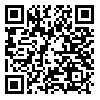1. Feizi Manesh B, Yarahmadi Y. A survey of the effect of Methadone Maintenance Treatment (MMT) on cognitive functions of opioid-dependent patients in central prison of Hamedan. Middle Eastern Journal of Disability Studies. 2017;7:16. [Persian] [
Article]
2. Abbasi A, Kamkar A, Panah Anbari A, Bagherizadeh B. The examination of students mental health in Yassoj university of medical sciences and health services. Teb Va Tazkieh. 2001;(43):34–8. [Persian]
3. Emamhadi MAl, Jalilvand M, Salehi M. Frequency of psychological disorders in male murderers. Social Welfare Quarterly. 2006;5(20):153–62. [Persian] [
Article]
4. Rodriguez CM. Personal contextual characteristics and cognitions: predicting child abuse potential and disciplinary style. J Interpers Violence. 2010;25(2):315–35. [
DOI]
5. WHO. Violence Against Women. Rafieifar Sh, Parsinia S. (Persian translator). Tehran: Tandis Publication; 2001.
6. Eslami-Shahrbabaki A, Eslami-Shahrbabaki M, Kalantari M. association between parental addiction and types of child abuse in high-school students of Kerman, Iran. Addict Health. 2013;5(3–4):108–14.
7. Evans GW, Cassells RC. Childhood Poverty, Cumulative Risk Exposure, and Mental Health in Emerging Adults. Clin Psychol Sci. 2014;2(3):287–96. [
DOI]
8. Greger HK, Myhre AK, Lydersen S, Jozefiak T. Child maltreatment and quality of life: a study of adolescents in residential care. Health Qual Life Outcomes. 2016;14(1):74. [
DOI]
9. Cecil CAM, Viding E, Fearon P, Glaser D, McCrory EJ. Disentangling the mental health impact of childhood abuse and neglect. Child Abuse Negl. 2017;63:106–19. [
DOI]
10. Habibi S, Falah MH, Amoodpour M. Asarat sooe koodak azari bar vijegihaye shakhsiyati koodakan [Adverse effects of child abuse on children's personality traits]. Journal of Psychological Studies and Educational Sciences. 2017;3(2):106–120. [Persian] [
Article]
11. Coohey C. Physically abusive fathers and risk assessment. Child Abuse Negl. 2006;30(5):467–80. [
DOI]
12. Takehara K, Suto M, Kakee N, Tachibana Y, Mori R. Prenatal and early postnatal depression and child maltreatment among Japanese fathers. Child Abuse Negl. 2017;70:231–9. [
DOI]
13. Kelley ML, Lawrence HR, Milletich RJ, Hollis BF, Henson JM. Modeling risk for child abuse and harsh parenting in families with depressed and substance-abusing parents. Child Abuse Negl. 2015;43:42–52. [
DOI]
14. Kholasezadeh G, Bashardoost N, Ahmadi N, Dastjerdi G. Investigation of prevalence of child abuse in addicts referring to the addiction withdrawal clinic. J Shahid Sadoughi Uni Med Sci. 2010;18(3):199–206. [Persian] [
Article]
15. Fujiwara T, Okuyama M, Izumi M. The impact of childhood abuse history, domestic violence and mental health symptoms on parenting behaviour among mothers in Japan. Child Care Health Dev. 2012;38(4):530–7. [
DOI]
16. Goldberg DP, Hillier VF. A scaled version of the General Health Questionnaire. Psychol Med. 1979;9(1):139–45. [
DOI]
17. Ignatyev Y, Assimov M, Aichberger MC, Ivens S, Mir J, Dochshanov D, et al. Psychometric properties of a Russian version of the General Health Questionnaire-28. Psychopathology. 2012;45(4):252–8. [
DOI]
18. Taghavi S. Validity and reliability of the General Health Questionnaire (ghq-28) in college students of Shiraz universi1y. J Psychology. 2002;5(4):381–98. [Persian]
19. Pittman JF, Buckley RR. Comparing maltreating fathers and mothers in terms of personal distress, interpersonal functioning, and perceptions of family climate. Child Abuse Negl. 2006;30(5):481–96. [
DOI]
20. Abbasi S, Najafi Fard T, Pour Sadoghi A, Yousefi S, Mohammadi Malek Abadi A, Delavar Kasmaei H. Effectiveness of attributive retraining on epileptic male children’s mental health. Shenakht Journal of Psychology & Psychiatry. 2016;2(4):70–82. [Persian] [
Article]
21. Khiri T, Abdollahi MH, Shahgholian M. Emotional intelligence, attachment styles, and self esteem in addicted and non-addicted. Journal of Health Psychology. 2013;2(7):69–81. [Persian] [
Article]
22. Leijdesdorff S, van Doesum K, Popma A, Klaassen R, van Amelsvoort T. Prevalence of psychopathology in children of parents with mental illness and/or addiction: An up to date narrative review. Current Opinion in Psychiatry. 2017;30(4):312–7. [
DOI]
23. Romero-Martínez A, Figueiredo B, Moya-Albiol L. Childhood history of abuse and child abuse potential: the role of parent’s gender and timing of childhood abuse. Child Abuse Negl. 2014;38(3):510–6. [
DOI]






